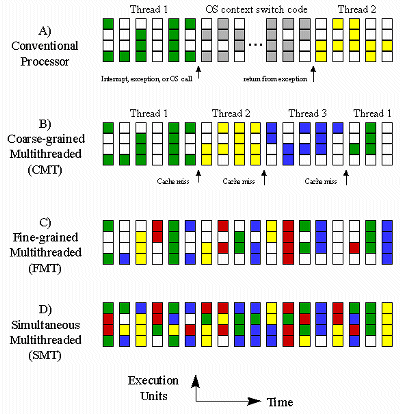Paul DeMone van Real World Technologies heeft vandaag het tweede deel van zijn artikel over de Alpha EV8 processor online gezet. De Alpha serie heeft qua performance altijd aan de leiding gestaan, de huidige 600MHz EV67 wint het nog makkelijk van een Pentium 4. Alpha is natuurlijk niet van plan de kroon uit handen te geven en gaat verder met de EV68 en EV7. Deze chips zullen echter grotendeels gebaseerd zijn op het EV6 ontwerp, met als extra toevoegingen een 0.18 micron fabrikageproces en on-die L2 cache.
De Alpha 21464 EV8, die in 2003 uitkomt met een snelheid van ongeveer 2GHz, zal echter een nieuw ontwerp hebben. Met 250 miljoen transistors, 0.13 micron SOI CMOS en een stroomverbruik van maar liefst 250 Watt zal deze SMT chip de traditie hoog moeten houden. In deel 1 legt Paul uit wat de belangrijkste verschillen ten opzichte van de oude EV6 processors zullen zijn en in deel 2 legt hij uit wat SMT nou precies is en wat er nodig is om dit te implementeren:
The EV8 uses a more powerful mechanism than either coarse or fine grained multithreading to exploit TLP. Called Simultaneous Multithreading (SMT), it allows the instructions from two or more threads to be issued to execution units each cycle. This process is illustrated conceptually in Figure 1D. The advantage of SMT is that it permits TLP to be exploited all the way down to the most fundamental level of hardware operation - instruction issue slots in a given clock period. This allows instructions from alternate threads to take advantage of individual instruction execution opportunities presented by the normal ILP inefficiencies of single thread program execution. SMT can be thought of as equivalent to the airline practice of using standby passengers to fill seats that would have otherwise flown empty.

